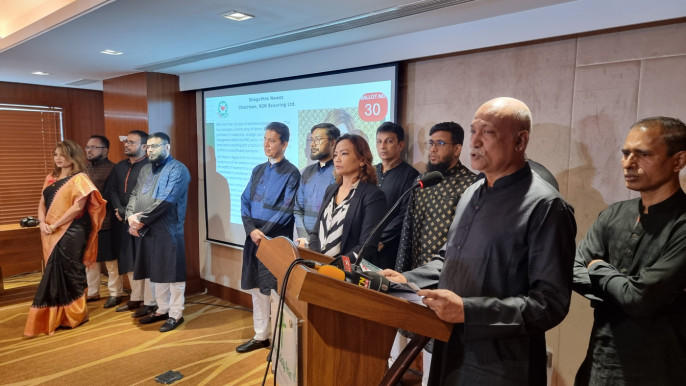Foreign buyers of readymade garments are increasingly focusing their attention on Bangladesh due to various global factors, including the US-China trade tension and the ongoing conflict in Myanmar, according to buying houses, which serve as local representatives of international fashion retailers and brands.
“We see that buyers are interested in Bangladesh at the moment. They are eyeing Bangladesh due to a rivalry with China,” said Kazi Iftequer Hossain, former president of the Bangladesh Garment Buying House Association, during a press conference at a city hotel.
“Additionally, there is an ethnic conflict ongoing in Myanmar, and no buyers are going there. So, buyers are turning to Bangladesh,” he said at the event, organised to introduce a panel, which he is leading, on the occasion of the association’s election.
Speaking to The Business Standard, Fazlee Shamim Ehsan, vice president of the Bangladesh Knitwear Manufacturers and Exporters Association (BKMEA), said, “Indirectly, we will benefit from the current situation in Myanmar.”
Explaining this, he said, “China has a large investment in Myanmar’s garment sector. If orders decrease in Myanmar, they may shift to China, and we may receive them too.”
The BKMEA leader said there is a possibility of increasing exports from Bangladesh starting next May.
An idea of the dynamics of apparel exports is obtained from exporters’ declarations of raw material usage, known as the Utility Declaration, or UD.
“UD is now gaining momentum,” he said, although he could not provide specific information regarding this matter.
Shovon Islam, managing director of Sparrow Group, one of the country’s largest apparel exporters, told TBS, “Bangladesh has already reaped some benefits from businesses moving away from China. More are likely to come. However, business has come from Myanmar only in recent years. There is not much chance of new arrivals.”
Additionally, he also mentioned that buyers are a bit apprehensive after former US President Donald Trump announced his intention to impose a 17% duty on Chinese goods if he returns to the White House.
“This may create an opportunity to increase our exports,” he added.
Buying association leader Kazi Iftequer also said they have already completed summer orders and are now moving towards winter orders, while also being in talks with buyers regarding new orders.
At the same time, he warned about various issues, including the attacks by Houthi rebels in the Red Sea and the increase in wages for garment workers.
He also expressed fear that if these problems are not collectively addressed, buyers may further reduce the price of clothes.
He said, “Due to tensions in the Red Sea, it is taking an additional 15 days to reach products to buyers, and freight charges have soared. Almost all exporters and buying houses in Bangladesh are facing various problems in bargaining with buyers due to the increase in freight costs.
To overcome the stalemate in the days to come, efforts must be made through the coordination of the government and the parties concerned. Otherwise, buyers will try to downgrade the price.”
At the press conference, the former president of the Bangladesh Garment Buying House Association demanded recognition of its member companies as trade exporters.
He said the current export equivalent of about $8 billion is conducted through their members. Last year, Bangladesh’s export of readymade garments amounted to about $47 billion.
It was also informed in the press conference that the association has 1,500 members, with 600 of them currently active.
The members nominated under their own panel called Buyers Council were introduced.
Former general secretary of the association, Aminul Islam, and other leaders were present at the event.









































